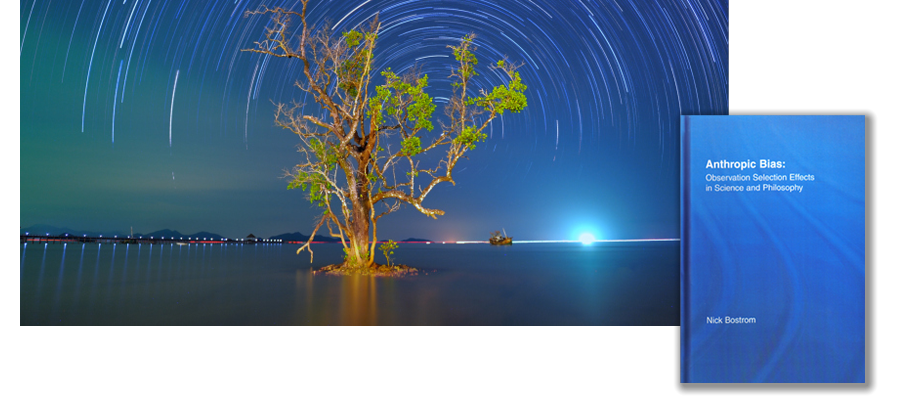Preamble
This work has benefited from copious feedback generated by previously published bits and pieces. Over the years, I must have corresponded with several hundreds of people about these issues. In addition, I’ve received comments from conference audiences, journal referees, authors, and students. For all this, I am extremely grateful!
There is a website associated with the book, www.anthropic-principle.com, containing a preprint archive of relevant writings that are available online, an updated bibliography, primers on various topics, and other resources to aid scholars and interested laypersons to get up to speed with the latest research on observation selection effects.
Although I cannot name everybody who has helped me in some way with this project, there are some who must be singled out for my special thanks: Paul Bartha, Darren Bradley, John Broome, Jeremy Butterfield, Erik Carlson, Brandon Carter, Douglas Chamberlain, Robin Collins, Pierre Cruse, Wei Dai, J-P Delahaye, Jean-Michel Delhotel, Dennis Dieks, William Eckhardt, Ellery Eells, Adam Elga, Hal Finney, Paul Franceschi, Richard Gott, Mark Greenberg, Robin Hanson, Daniel Hill, Christopher Hitchcock, Richard Jeffrey, Bill Jefferys, Vassiliki Kambourelli, Loren A. King, Kevin Korb, Eugene Kusmiak, Jacques Mallah, Neil Manson, Peter Milne, Bradley Monton, Floss Morgan, Samuel Newlands, Jonathan Oliver, Ken Olum, Don N. Page, David Pearce, Elliott Sober, Richard Swinburne, Max Tegmark, Alexander Vilenkin, Saar Wilf, and Roger White. I am so grateful to all those friends, named and unnamed, without whose input this book could not have been written. (The faults that it contains, however, I was perfectly capable of producing all by myself!)
I want to especially thank John Leslie for his exceedingly helpful guidance, Colin Howson and Craig Callender for long assistance and advice, Nancy Cartwright for stepping in and removing a seemingly insurmountable administrative obstacle, and Milan M. Çirkoviç for keeping up collaboration with me on a paper whilst bombs were detonating around him in Belgrade. Finally, I want to thank Robert Nozick for encouraging rapid publication.
I gratefully acknowledge a research grant from the John Templeton Foundation that has helped fund large parts of this work. I’m thankful to Synthese, Mind, Analysis, Journal of Evolution and Technology, and Erkenntnis for permitting texts to be republished.
This book explores how to reason when you suspect that your evidence is biased by observation selection effects. An explanation of what observation selection effects are has to await chapter 1. Suffice it to say here that the topic is intellectually fun, difficult, and important. We will be discussing many interesting applications. Philosophical thought experiments and paradoxes aside, we will use our results to address several juicy bits of contemporary science: cosmology (how many universes are there?), evolution theory (how improbable was the evolution of intelligent life on our planet?), the problem of time’s arrow (can it be given a thermodynamic explanation?), game theoretic problems with imperfect recall (how to model them?), traffic analysis (why is the “next lane” faster?) and a lot more—the sort of stuff that intellectually active people like to think about...
One note to the reader before we start. Whether because of an intrinsic organic quality of the subject matter or because of defects in my presentation skills, I have found it difficult to organize the exposition in a completely linear sequence where each chapter can be fully comprehended without having read what comes after. Instead, some important themes are revisited many times over the course of this book, and some essential qualifications are added in a piecemeal fashion. I would plead that the reader not rush to a judgement until the last page has been reached and the idea-complex has been grasped in its entirety.
